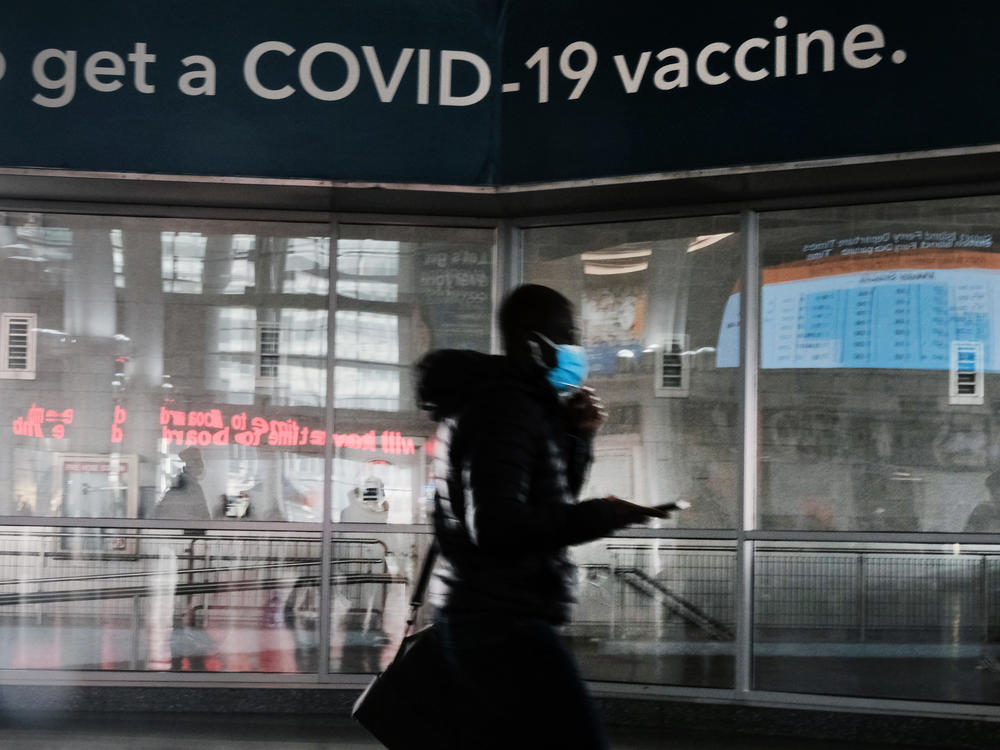Section Branding
Header Content
As NYC sets broad vaccine mandate for workers, federal vaccine rules remain blocked
Primary Content
In what the city says is "a first in the nation measure," New York City is now mandating the COVID-19 vaccine for all private sector employers, effective Dec. 27.
But elsewhere, federal vaccine rules aimed at some 100 million private sector and health care workers are tied up in a legal morass, with multiple courts now blocking the rules even as the first deadlines have arrived.
Dozens of lawsuits filed by Republican states, businesses, religious organizations and others seek to overturn the requirements, calling them an overreach of government authority and a threat to employers already stretched thin in the pandemic.
The Occupational Safety and Health Administration's vaccine-or-test rule would have required that companies with 100 or more employees determine which of their workers are vaccinated and which are not, and enforce a mask mandate for the unvaccinated starting today. By Jan. 4, according to the rule, they must ensure that all workers are either vaccinated or getting tested weekly.
But for now, those deadlines are off. Last month, a federal appeals court issued a stay, citing "grave statutory and constitutional issues with the Mandate."
The Biden administration has asked the 6th Circuit Court of Appeals to undo the stay, asserting that the rule could save the lives of 6,500 workers and prevent 250,000 hospitalizations over a six-month period. The court is not expected to rule on the stay until Dec. 10 at the earliest.
Federal vaccine mandate for health care workers also on pause
Meanwhile, the Centers for Medicare & Medicaid Services rule requiring most health care workers in the U.S. to be vaccinated by Jan. 4, with no option for testing, has also been halted by federal courts. States suing to overturn the rule have warned that the mandate "threatens to exacerbate an alarming shortage of healthcare workers, particularly in rural communities, that has already reached a boiling point."
In a memo issued Dec. 2, CMS said while it "remains confident in its authority to protect the health and safety of patients," it was suspending enforcement of the mandate while it appeals the court decisions.
Both the CMS rule and the OSHA rule could wind up at the U.S. Supreme Court.
Lastly, President Biden's vaccine mandate for federal contractors, requiring vaccinations by Jan. 4, has been blocked in three states — Kentucky, Ohio, and Tennessee — but remains in effect in the rest of the country, for now.
Mayor de Blasio says he's confident New York City's mandate will hold up
In announcing New York City's mandate for private sector workers, de Blasio pointed to colder weather, holiday gatherings and the Omicron variant as factors that could drive infections.
"We in New York City have decided to use a preemptive strike to really do something bold to stop the further growth of Covid and the dangers it's causing to all of us," he said.
He expressed confidence that the mandate will survive legal challenges and went as far as to urge other mayors, governors, and CEOs to impose mandates of their own.
"The more universal they are, the more likely employees will say 'Okay, it's time. I'm going to do this,'" de Blasio told MSNBC.
But de Blasio's tenure as mayor ends at midnight on New Year's Eve. A spokesman for Mayor-elect Eric Adams said Adams will evaluate the mandate and other Covid strategies when he takes office Jan. 1.
City workers, educators and health care workers in New York City were already covered by vaccine mandates issued earlier this fall. More than 90% of workers in those sectors have gotten vaccinated, but the city has put thousands of city employees who refused a vaccine on unpaid leave.
With essentially all workers in New York City now covered by a vaccine mandate, de Blasio pointed out that workers cannot jump from one industry to another or one company to another.
"It's something that needs to be universal to protect all of us," he said.
Copyright 2021 NPR. To see more, visit https://www.npr.org.

